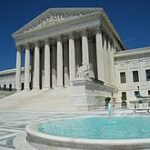The recent unveiling of the Supreme Court’s Code of Conduct seems to based, uncontroversially, on the existing Code of Conduct for U.S. Judges. The Court’s code, mirroring the structure and canons of its judicial counterpart, appears as a set of guidelines, with the exclusion of rules more applicable to lower courts.
 The code largely aligns with the ABA Model Code, emphasizing existing disciplinary processes rather than explicit enforcement measures.
The code largely aligns with the ABA Model Code, emphasizing existing disciplinary processes rather than explicit enforcement measures.
However, unlike the Code of Conduct for U.S. Judges, the new SCOTUS Code lacks explicit language urging justices to take action upon learning of potential code violations by their peers. This omission, perhaps made to preserve collegial relations, may inadvertently undermine confidence in the court’s commitment to upholding its code.
A conspicuous absence in the SCOTUS Code is the duty to “be faithful to… the law,” as outlined in Canon 3(A)(1) of the Code of Conduct for U.S. Judges. While the court retained an obligation to “respect and comply with the law,” the distinction is significant. The duty to be faithful to the law extends beyond personal adherence, emphasizing a commitment to uphold and apply the law in judicial decision-making. This omission raises concerns, especially given the increased scrutiny of the court’s decisions.
Controversially, the SCOTUS Code introduces modifications to disqualification rules, departing from statutory requirements outlined by Chief Justice John Roberts and rejected by Justice Samuel Alito. The shift from mandatory “shalls” to hortatory “shoulds” in the SCOTUS Code may create ambiguity, particularly in the realm of impartiality. The introduction of the “rule of necessity” adds further complexity, implying potential exceptions to disqualification based on the perceived need for all justices to participate.
Critics argue that the SCOTUS Code’s disqualification provisions, including the presumption of impartiality and the reinterpretation of the standard for disqualification, may raise eyebrows. The introduction of the “rule of necessity” as a potential override to disqualification sparks concerns about the court’s commitment to maintaining the highest ethical standards.
Ultimately, the impact of the SCOTUS Code on mitigating controversies over justices’ conduct depends on the court’s sincere commitment to its guidelines. The absence of extensive commentary, present in the Code of Conduct for U.S. Judges, and the conflicting messages in the preamble contribute to skepticism. The tension within the court itself regarding its exceptionalism and connection to the broader American judiciary remains evident, leaving room for ongoing debate over the court’s ethical responsibilities.